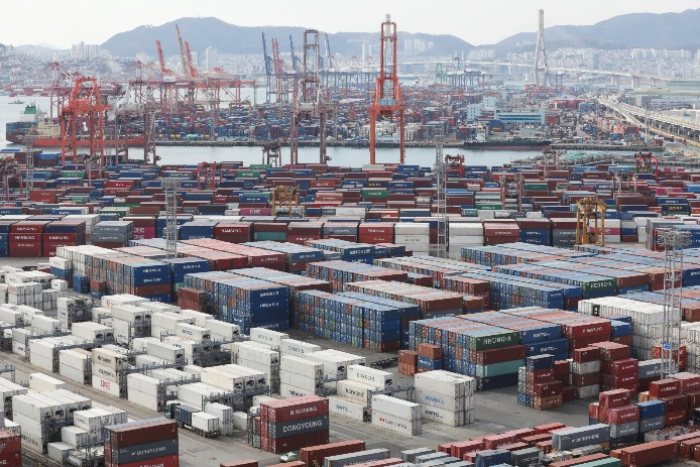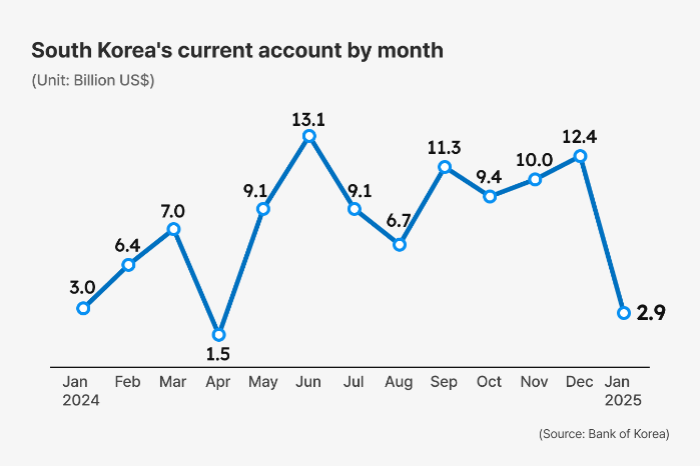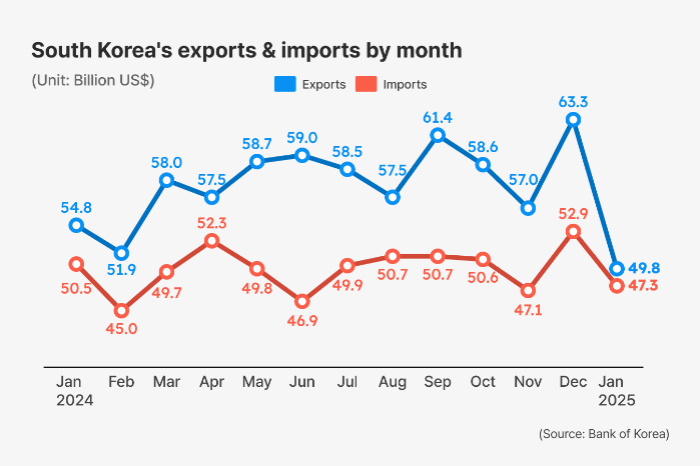Economy
S.Korea logs current account surplus in Jan; Growth slows
The country's goods account surplus declined amid a fall in exports of mainstay items chips and cars
By Mar 07, 2025 (Gmt+09:00)
3
Min read
Most Read
LG Chem to sell water filter business to Glenwood PE for $692 million


KT&G eyes overseas M&A after rejecting activist fund's offer


Kyobo Life poised to buy Japan’s SBI Group-owned savings bank


StockX in merger talks with Naver’s online reseller Kream


Meritz backs half of ex-manager’s $210 mn hedge fund



South Korea reported a current account surplus for 21 straight months in January but with a moderated gain largely due to a contraction in the goods account surplus on the back of fewer shipments of its mainstay exports, chips and cars, to overseas markets.
The current account surplus of Asia’s No. 4 economy reached $2.94 billion in January, extending the profit streak for the 21st month in a row, Bank of Korea data showed on Friday.
The excess edged down from $3.05 billion in the same month last year, while contracting to about one-fourth the $12.37 billion surplus of the previous month.
The current account is the broadest measure of Korea's trade with the rest of the world.
The decrease was mainly due to a shrinking goods account surplus driven by a fall in exports with fewer working days in January, when the Lunar New Year holiday was celebrated, said the central bank.
It is unclear, however, how fast Korea’s exports will recover this year after strong exports drove the country's current account surplus for 2024 to more than triple that of a year earlier.
Late last month, the central bank slashed this year’s growth forecast for Korea's heavy export-reliant economy to 1.5% from the previous 1.9%, citing the ongoing political turmoil in the wake of the short-lived martial law declaration in December and looming US tariff threats on the country’s mainstay exports, semiconductors and cars.

SMALLER GOODS ACCOUNT SURPLUS
Korea’s goods account surplus stood at $2.50 billion in the first month of this year, down from $4.36 billion a year ago and $10.43 billion a month ago.
Over the same period, the country’s exports shrank 9.1% on-year to $49.81 billion, marking the first on-year fall in exports since September 2023 with a drop of 1.6%. Imports also declined 6.2% to $47.31 billion.
Shipments of semiconductors —the country’s core export item — grew 7.2% year-on-year to $10.22 billion, but the growth slowed compared with a 52.8% jump a year ago.
Vehicle exports decreased 19.2% on-year to $4.83 billion, reversing a 24.8% gain of a year ago while accelerating the decline from a 5.9% shortfall the prior month.
Shipments to China, the European Union, the US, Japan and Southeast Asia shrank by 14.0%, 11.6%, 9.4%, 7.7% and 3.8%, respectively.
Due to a fall in energy prices, the country’s commodity imports dwindled by 9.8%, while imports of consumer goods declined 10.3%.

TRAVEL ACCOUNT DEFICIT WIDENS
The services account posted a $2.06 billion deficit in January, narrowing from the previous month’s loss of $2.11 billion and $2.86 billion the year prior.
The travel account deficit, however, widened to $1.68 billion from a shortfall of $1.51 billion a year ago and $950 million a month ago.
January’s primary income account, which tracks wages of foreign workers and dividend payments overseas, logged a profit of $2.62 billion, nearly half the $4.76 billion surplus of last December due to a decline in dividend income to $1.90 billion from $3.59 billion.
Koreans’ securities investments overseas rose by $12.55 billion, while foreigners’ investments in Korean stocks and bonds decreased by $290 million.
In the financial account, Koreans' overseas direct investment shrank by $940 million in January, while foreigners’ investment in the country rose by $1.23 billion.
Write to Jin-gyu Kang at josep@hankyung.com
Sookyung Seo edited this article.
More to Read
-

-
 EconomyKorean exports snap 15 months of gains in Jan despite higher chip sales
EconomyKorean exports snap 15 months of gains in Jan despite higher chip salesFeb 02, 2025 (Gmt+09:00)
2 Min read -
 EconomyKorea’s 2024 exports hit all-time high, driven by chips, shipments to China
EconomyKorea’s 2024 exports hit all-time high, driven by chips, shipments to ChinaJan 02, 2025 (Gmt+09:00)
2 Min read -
 EconomySouth Korea jumps to world’s No. 6 exporter; 2025 outlook dims
EconomySouth Korea jumps to world’s No. 6 exporter; 2025 outlook dimsDec 29, 2024 (Gmt+09:00)
4 Min read -
 Business & PoliticsKorea’s president impeached over martial law; political turmoil to ease
Business & PoliticsKorea’s president impeached over martial law; political turmoil to easeDec 14, 2024 (Gmt+09:00)
3 Min read -
 Business & PoliticsKorea mulls raising US oil imports to cope with Trump trade policies
Business & PoliticsKorea mulls raising US oil imports to cope with Trump trade policiesNov 20, 2024 (Gmt+09:00)
4 Min read -
 EconomyS.Korea’s current account at near 7-year high on strong chip exports
EconomyS.Korea’s current account at near 7-year high on strong chip exportsAug 07, 2024 (Gmt+09:00)
3 Min read
Comment 0
LOG IN


